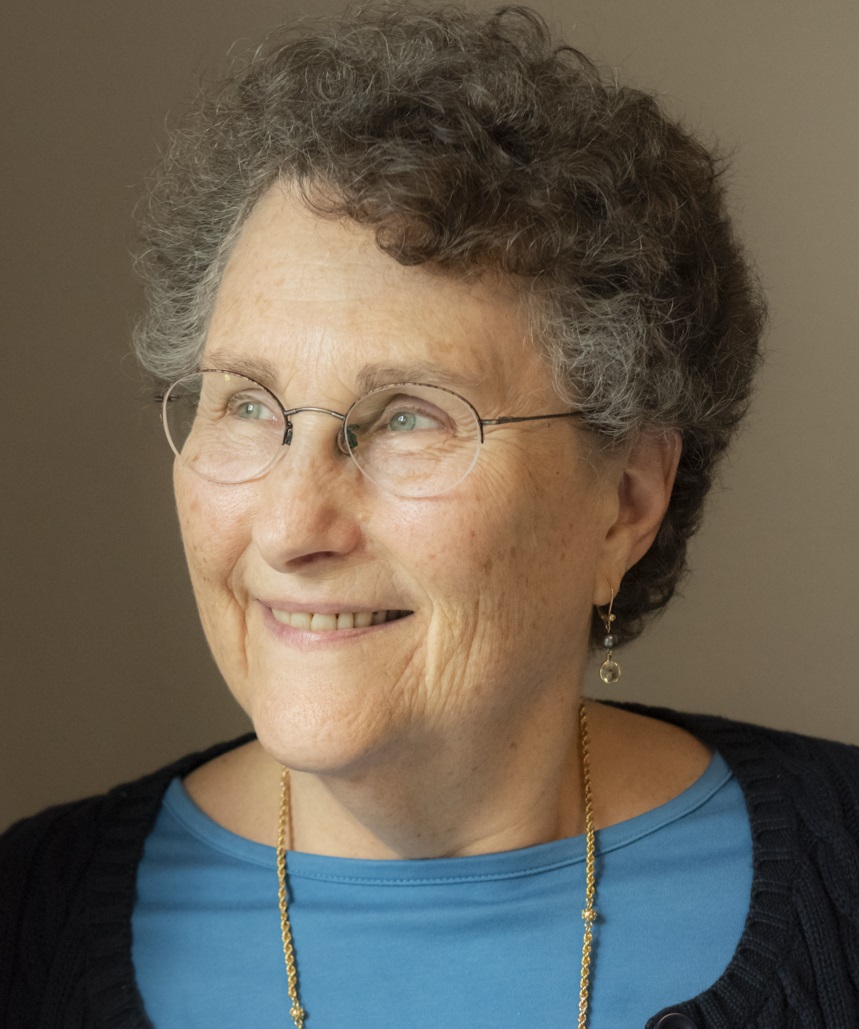Simplicity and prayer
Lynne Baab • Tuesday May 23 2023

God of beauty and peace, help me to uncomplicate and untangle my life so I can focus on what really matters.
In that prayer for simplicity, I am using Adele Ahlberg Calhoun’s words from her wonderful Spiritual Disciplines Handbook. She writes that our desire in embracing the spiritual practice of simplicity is “to uncomplicate and untangle my life so I can focus on what really matters.” [1] I love that the words “uncomplicate and untangle” can refer to many things: our physical possessions that can feel overwhelmingly cluttered, our schedule that can feel endlessly complicated, and our relationships that can feel hopelessly tangled.
When considering the spiritual practice of simplicity, it can be easy to get sidetracked into a Marie Kondo-style perspective that focuses primarily on de-cluttering our living spaces and storage closets. Her book, The Life-Changing Magic of Tidying Up, was published just over a decade ago and profoundly influenced people who feel that the possessions in their home are out of control. Yes, the spiritual practice of simplicity can motivate us to reduce the number of possessions surrounding us, but this ancient practice goes much deeper.
A few years ago, I wrote an article for a magazine about simplicity. I called it "Seven Days Toward Simplicity,” and I focused on seven areas where we can practice simplicity. To figure out those seven areas, I did some reading about the Christian monastic movement, which began more than 1500 years ago. Monks and sisters practiced many forms of simplicity in their personal and communal lives so that they could pray with fewer distractions and offer abundant hospitality to people in need.
To write the article I also studied the four-page section on simplicity in the Spiritual Disciplines Handbook. Calhoun cites several scripture verses to help us ponder simplicity.
Jesus tells his followers: “Simply let your ‘Yes’ be ‘Yes,’ and your ‘No,’ ‘No.’” (Matthew 5:37). This refers to what I call simplicity of speech. Calhoun encourages us to stop making excuses and unnecessary apologies. She encourages taking ten minutes to make decisions rather than instantly saying “yes” or “no.” For those of us who tend to be talkative, simplicity of speech also includes reining in our tendency to give a great deal of background information every time we tell a story or make a statement. We can pray to simplify our speech.
Calhoun cites the Apostle Paul’s words in Philippians 4:11-12 about being content in all circumstances. Simplicity is not an end in itself. One of the goals of simplicity is to increase our contentment with the essential things in life. We can ask for God’s guidance to perceive the areas of our life that we could simplify in order to experience more contentment in Christ.
Calhoun also quotes Jesus’s famous words in the Sermon on the Mount: “Do not store up for yourselves treasures on earth, where moth and rust consume and where thieves break in and steal; but store up for yourselves treasures in heaven. . . . For where your treasure is, there your heart will be also” (Matthew 6:19-21). For me, these verses are at the heart of the spiritual practice of simplicity. This practice helps us identify where our true treasure is. It helps us perceive pseudo-treasures that might be satisfying in the short run but are less satisfying over time. Some of these pseudo-treasures actually prove to be harmful.
The challenge here is that the very same possession or activity can be joyous and life-giving one time, and energy sapping and destructive another time. A related challenge is that a possession or activity can connect me to Jesus, while it is harmful for a friend. We need the Holy Spirit’s perception and guidance in each moment to help us make choices that are consistent with the true treasures that we value. This presents a significant call to prayer that comes from the practice of simplicity. God, help us value your true treasures so much that we rely on your Spirit's guidance when we make choices.
To stimulate your prayers, I’ll list the seven areas I wrote about in my article:
- Simplicity of words
- Simplicity of possessions
- Simplicity and nature
- Simplicity with money
- Simplicity and relationships
- Simplicity and silence
- Simplicity in prayer
You may have very different thoughts about these areas than I did when I wrote the article. Hopefully, one or two of them will stimulate your prayers.
Since this post focuses on simplicity and prayer, I’ll give you the suggestions I wrote about that topic:
At its simplest, all verbal prayer can fit into two categories: “thank you” and “help.” For today, watch your patterns of prayer. Which do you find easiest, thank-you prayers or help prayers? What kind of thank-you prayers do you pray most often? What kind of help prayers? Do you get lost in too many words as you pray? Pray for those who live in spiritual poverty and do not know that God welcomes “thank you” and “help” prayers from them.
I had a limited word count when I wrote the article, so I couldn’t expound on another related topic: the feeling that we are supposed to be eloquent when we pray, especially when we pray with others. One of the many beautiful aspects of the Lord’s Prayer, that Jesus taught his disciples, is its simplicity (Matthew 6:9-13). That simplicity was virtually unknown in the ancient world, where flowery and long-winded prayers were common in the various religions that surrounded the Mediterranean Sea.
One of Calhoun’s reflection questions asks, “How has the ‘more is better’ mentality shaped you?” I encourage you to ponder this question and pray for God’s guidance that your life choices will reflect where your true treasure is. God of beauty and peace, help me to uncomplicate and untangle my life so I can focus on what really matters.
(Next week: hospitality and prayer. Illustration by Dave Baab. If you’d like to receive an email when I post on this blog, sign up under “subscribe” below.)
Previous posts about simplicity:
- Worshipping the Creator: Voluntary simplicity
- Worshipping the Creator: Voluntary simplicity in action
- Creative prayer: Pressing pause
This is the second post in a series about spiritual practices and prayer. Last week's post, where I describe what spiritual practices are and why they matter, is here. You can also find a list of all the posts in the series.
[1] Adele Ahlberg Calhoun’s section on simplicity in the Spiritual Disciplines Handbook, 2015 edition, is pages 84 to 87.
Next post »« Previous post
Subscribe to updates
To receive an email alert when a new post is published, simply enter your email address below.

Lynne M. Baab, Ph.D., is a teacher and writer. She has written numerous books, Bible study guides, and articles for magazines and journals. Lynne is passionate about prayer and other ways to draw near to God, and her writing conveys encouragement for readers to be their authentic selves before God. She encourages experimentation and lightness in Christians spiritual practices. Read more »
Lynne is pleased to announce the release of her book on grief and gratitude, designed to help people grieving from anything, including the pandemic, while also desiring to notice God's good gifts. Two Hands: Grief and Gratitude in the Christian Life is available in paperback, audiobook, and for kindle. Lynne's 2018 book is Nurturing Hope: Christian Pastoral Care for the Twenty-First Century, and her best-selling book is Sabbath-Keeping: Finding Freedom in the Rhythms of Rest (now available as an audiobook as well as paperback and kindle). You can see her many other book titles here, along with her Bible study guides.
Lynne recently spoke about empathy and also about bringing spiritual practices to life.
Lynne was interviewed recently for the podcast "As the Crow Flies". The first episode focuses on why listening matters and the second one on listening skills.
Here are two talks Lynne gave on listening (recorded in audio form on YouTube): Listening for Mission and Ministry and Why Listening Matters for Mission and Ministry.
"Lynne's writing is beautiful. Her tone has such a note of hope and excitement about growth. It is gentle and affirming."
— a reader
"Dear Dr. Baab, You changed my life. It is only through God’s gift of the sabbath that I feel in my heart and soul that God loves me apart from anything I do."
— a reader of Sabbath Keeping
Subscribe
To receive an email alert when a new post is published, simply enter your email address below.
Featured posts
- Drawing Near to God with the Heart: first post of a series »
- Quotations I love: Henri Nouwen on being beloved »
- Worshipping God the Creator: the first post of a series »
- Sabbath Keeping a decade later: the first post of a series »
- Benedictine spirituality: the first post of a series »
- Celtic Christianity: the first post of a series »
- Holy Listening »
- A Cat with a Noble Character »
- Welcome to my website »
Tags
Archive
- April 2024 (4)
-
March 2024 (5)
- Friendship, loneliness, and prayer: Praying about distractions from empathy
- Friendship, loneliness, and prayer: Praying to keep empathy flowing
- Friendship, loneliness, and prayer: Everyday initiative
- Friendship, loneliness, and prayer: Praying for guidance for ending conversations
- Friendship, loneliness, and prayer: Reflecting on the series
- February 2024 (4)
- January 2024 (2)
-
December 2023 (6)
- Friendship, loneliness, and prayer: Initiating
- Friendship, loneliness, and prayer: Praying about listening roadblocks
- Friendship, loneliness, and prayer: Praying to love the poverty in our friends
- Friendship, loneliness, and prayer: Praying for “holy curiosity”
- Friendship, loneliness, and prayer: Praying for “holy listening”
- Friendship, loneliness, and prayer: Praying to give affection extravagantly
- November 2023 (4)
-
October 2023 (5)
- Friendship, loneliness and prayer: A listening skill with two purposes
- Friendship, loneliness, and prayer: Saying “thank you” to friends
- Friendship, loneliness, and prayer: One more way reflecting helps us
- Friendship, loneliness, and prayer: Lessons from two periods of loneliness
- Friendship, loneliness, and prayer: Types of reflecting, a listening skill
- September 2023 (4)
- August 2023 (4)
- July 2023 (5)
- June 2023 (3)
- May 2023 (6)
- April 2023 (4)
- March 2023 (4)
- February 2023 (4)
- January 2023 (4)
- December 2022 (5)
- November 2022 (1)
- October 2022 (5)
- September 2022 (5)
-
August 2022 (6)
- Draw near: Confessing sin without wallowing
- Draw near: A favorite prayer about peace, freedom, and much more
- Drawing near with Desmond Tutu: God’s love is the foundation for prayer
- Draw near: Worshipping God with Desmond Tutu
- Draw near: Yearning, beseeching and beholding with Desmond Tutu
- Draw near: Praising God with Desmond Tutu
- July 2022 (2)
- June 2022 (6)
- May 2022 (5)
- April 2022 (6)
- March 2022 (5)
- February 2022 (4)
- January 2022 (3)
- December 2021 (5)
- November 2021 (4)
- October 2021 (5)
- September 2021 (4)
- August 2021 (4)
- July 2021 (4)
- June 2021 (4)
- May 2021 (4)
- April 2021 (5)
- March 2021 (4)
- February 2021 (4)
- January 2021 (4)
- December 2020 (5)
- November 2020 (3)
- October 2020 (5)
- September 2020 (4)
- August 2020 (4)
- July 2020 (5)
- June 2020 (4)
-
May 2020 (4)
- Spiritual diary of sheltering in place: The lifeline of separating thoughts from feelings
- Spiritual diary of sheltering in place: The lifeline of welcoming prayer
- Spiritual diary of sheltering in place: a kite string as a lifeline
- Spiritual diary of sheltering in place: The lifeline of God’s distant future
-
April 2020 (7)
- Spiritual diary of self-isolation: the lifeline of God’s constancy
- Spiritual diary of sheltering in place: The lifeline of accepting my place as a clay jar
- Spiritual diary of sheltering in place: the lifeline of memories
- Spiritual diary of sheltering in place: the lifeline of “Good” in “Good Friday”
- Spiritual diary of sheltering in place: The lifeline of “easier does not mean easy”
- Spiritual diary of sheltering in place: The lifeline of nature
- Spiritual diary of sheltering in place: the lifeline of God’s voice through the Bible
-
March 2020 (7)
- Important anniversaries in 2020: The first Earth Day in 1970
- Important anniversaries in 2020: Florence Nightingale was born in 1820
- Spiritual diary of self-isolation: Weeks 1 and 2
- Spiritual diary of self-isolation: God's grace as a lifeline
- Spiritual diary of self-isolation: The lifeline of limits on thoughts
- Spiritual diary of self-isolation: Wrestling with God for a blessing
- Spiritual diary of self-isolation: responding to terror by listening to Jesus voice
- February 2020 (4)
- January 2020 (5)
- December 2019 (4)
- November 2019 (4)
- October 2019 (5)
- September 2019 (4)
- August 2019 (5)
- July 2019 (4)
- June 2019 (4)
- May 2019 (5)
- April 2019 (4)
- March 2019 (4)
- February 2019 (4)
-
January 2019 (5)
- Nurturing friendships in a cellphone world: Jesus as Friend
- Nurturing friendships in a cellphone world: Friendship with Christ and friendship with others
- Nurturing friendships in a cellphone world: Who is my neighbor?
- Nurturing friendships in a cellphone world: Friendship as action
- Nurturing friendships in a cellphone world: Hymns that describe friendship with God
- December 2018 (3)
-
November 2018 (5)
- Connections between the Bible and prayer: Sensory prayer in Revelation
- First post in a new series: Nurturing friendships in a cellphone world
- Nurturing friendships in a cellphone world: Strong opinions and responses
- Nurturing friendships in a cellphone world: My conversation partners about friendship
- Nurturing friendships in a cellphone world: Two views about communication technologies
- October 2018 (4)
- September 2018 (4)
-
August 2018 (5)
- Providing Christian Care in Our Time
- Providing Christian care in our time: Seven trends in pastoral care today
- Providing Christian Care in Our Time: Skills for Pastoral Care
- Providing Christian care: The importance of spiritual practices
- First post in a new series: Connections between the Bible and prayer
- July 2018 (4)
- June 2018 (4)
- May 2018 (5)
- April 2018 (4)
- March 2018 (5)
- February 2018 (4)
- January 2018 (4)
- December 2017 (5)
- November 2017 (4)
- October 2017 (4)
- September 2017 (5)
- August 2017 (4)
- July 2017 (4)
- June 2017 (4)
-
May 2017 (5)
- My new spiritual practice: Separating thoughts from feelings
- My new spiritual practice: Feeling the feelings
- My new spiritual practice: Coping with feelings that want to dominate
- My new spiritual practice: Dealing with “demonic” thoughts
- My new spiritual practice: Is self-compassion really appropriate for Christians?
- April 2017 (4)
- March 2017 (5)
- February 2017 (4)
- January 2017 (4)
- December 2016 (5)
- November 2016 (4)
- October 2016 (4)
- September 2016 (5)
- August 2016 (4)
- July 2016 (4)
- June 2016 (4)
- May 2016 (5)
- April 2016 (4)
- March 2016 (5)
- February 2016 (4)
- January 2016 (4)
- December 2015 (4)
- November 2015 (4)
- October 2015 (5)
- September 2015 (4)
- August 2015 (4)
- July 2015 (4)
- June 2015 (4)
- May 2015 (4)
- April 2015 (6)
- March 2015 (4)
- February 2015 (4)
- January 2015 (4)
- December 2014 (5)
- November 2014 (4)
- October 2014 (4)
- September 2014 (4)
- August 2014 (5)
- July 2014 (4)
- June 2014 (7)





















